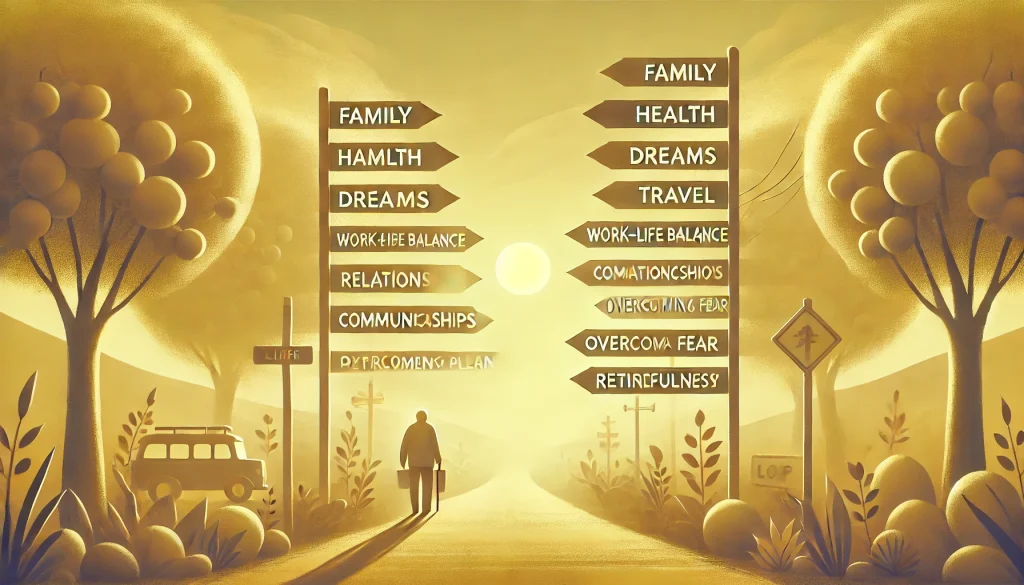10 Common Life Regrets People Have When They Get Older and How to Avoid Them

10 Common Life Regrets People Have As people age, they often reflect on their lives and the choices they’ve made. Some decisions bring satisfaction, while others may lead to regret. Understanding these common regrets can help you live a more fulfilling life and minimize the chances of looking back with a sense of “what if.” Here are 10 things people commonly regret as they grow older, and how you can take steps to avoid these pitfalls.
Table of Contents
1. Not Spending Enough Time with Your Love
One of the most frequently mentioned regrets among older adults is not spending enough time with family and friends. As life gets busy with work, responsibilities, and other obligations, it’s easy to let relationships slide. However, in hindsight, many realize that the moments shared with loved ones are the most valuable.
How to Avoid It: Make time for the people who matter most. Schedule regular gatherings, make phone calls, and stay connected. Prioritize relationships over material pursuits whenever possible.
2. Neglecting Personal Health
Many older individuals regret not taking better care of their health when they were younger. Poor eating habits, lack of exercise, and ignoring medical advice can lead to chronic conditions that could have been prevented.
How to Avoid It: Adopt a healthy lifestyle now. Regular exercise, a balanced diet, and routine medical check-ups can go a long way in ensuring a healthier future.
3. Busy Too Much and Missing Out on Life
The relentless pursuit of career success often comes at the expense of personal life. Many people regret working long hours and not spending enough time enjoying life outside of work.
How to Avoid It: Strive for work-life balance. Set boundaries and make time for hobbies, travel, and relaxation. Remember that while work is important, it shouldn’t consume your entire life.
4. Not Taking Risks and Following Dreams
Fear of failure or the unknown often prevents people from pursuing their dreams. As they age, many regret not taking more risks and following their passions, whether it’s a career change, starting a business, or traveling the world.
How to Avoid It: Start small, set achievable goals, and take steps toward the life you truly want.
5. Staying in Unhealthy Relationships
Staying in toxic or unfulfilling relationships is a common regret among older individuals. Whether it’s a romantic relationship, friendship, or even family ties, enduring unhealthy dynamics can lead to long-term unhappiness.
How to Avoid It: Assess your relationships and make necessary changes. Surround yourself with positive, supportive people, and don’t be afraid to distance yourself from those who bring negativity or harm.
6. Not Saving Enough Money for Retirement
Financial regret is another common issue. Many older adults wish they had started saving for retirement earlier or had been more diligent about managing their finances.
How to Avoid It: Start saving and investing as early as possible. Create a financial plan, set aside money for retirement, and live within your means.
7. Caring Too Much About What Others Think
Worrying excessively about others’ opinions can hold you back from living authentically. Many people regret not being true to themselves and making decisions based on societal expectations rather than their own desires.
How to Avoid It: Focus on what makes you happy and fulfilled. It’s impossible to please everyone, so prioritize your own values and goals. Embrace your individuality and don’t let the fear of judgment dictate your choices.
8. Not Traveling Enough
Travel is often cited as one of life’s greatest pleasures. Many older people regret not taking the opportunity to explore the world, experience different cultures, and create memories through travel.
How to Avoid It: Make travel a priority if it’s something you value. Plan trips, even if they’re small, and explore new places whenever you can. Traveling doesn’t have to be expensive—there are many ways to see the world on a budget.
9. Not Continuing to Learn and Grow
Some people regret not investing in their personal growth or education as they age. Whether it’s formal education, learning new skills, or personal development, the desire to continue growing doesn’t diminish with age.
How to Avoid It: Commit to lifelong learning. Take courses, read books, and seek out experiences that challenge you and expand your horizons. Staying curious and engaged with the world around you can keep you feeling vibrant and fulfilled.
10. Not Saying “I Love You” Enough
As simple as it sounds, not expressing love and appreciation to those who matter is a regret that often surfaces later in life. People wish they had told their loved ones how much they cared more often.
How to Avoid It: Don’t hold back when it comes to expressing love and gratitude. Tell the people in your life how much they mean to you, and don’t wait for special occasions to do so. These small acts of kindness can strengthen your relationships and create lasting bonds.
How to Live a Life Without Regret
Avoiding these common regrets involves being mindful of the choices you make daily. Here are some additional tips to help you live a life with fewer regrets:
- Set Goals: Define what you want to achieve in life, both personally and professionally. Having clear goals can guide your decisions and help you stay focused on what truly matters.
- Reflect Regularly: Take time to reflect on your life periodically. Are you happy with the direction you’re heading? Are there areas where you need to make changes? Regular self-reflection can help you stay on track.
- Be Present: Live in the moment and appreciate the here and now. Mindfulness can help you enjoy life more fully and reduce the likelihood of looking back with regret.
- Seek Balance: Strive for balance in all areas of your life. Whether it’s work and play, saving and spending, or relationships and solitude, finding balance can help you lead a more fulfilling life.
- Practice Gratitude: Cultivate an attitude of gratitude. Being thankful for what you have can help you focus on the positives in your life and reduce the tendency to dwell on missed opportunities.
Conclusion
While it’s natural to have some regrets in life, understanding common regrets and taking proactive steps can help you minimize them. By prioritizing relationships, health, personal growth, and authentic living, you can look back on your life with a sense of fulfillment rather than regret. Remember, it’s never too late to make changes and start living a life that aligns with your true values and desires.


